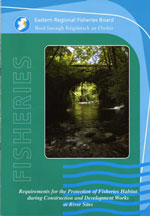Stop the spread of Lagarosiphon major
Curley leaved waterweed (Lagarosiphon major)is a major threat to
Ireland's watercourses.
The weed
- Aggressive, invasive, alien plant species that originated in Southern
Africa, where it is regarded as a nuisance weed.
- The plant can grow in water up to 6m deep.
- In addition to occupying the full water column, plant stands produce
dense vegetation on the water surface.
- The leaves are strongly recurved and are borne in whorls of 3 or
in a spiral arrangement.
- The long stem is brittle and easily broken (aiding dispersal).
- Only female plants are present and all reproduction is by fragmentation
or vegetative reproduction.
- Detached stems, when they sink, root from the nodes and establish
new populations.
|
 |
The Problem
- Currently, in Ireland, we are at an early stage in infestation;
however, significant weed stands exist in Lough, Corrib.
- Forms very dense infestations in suitable habitats
- Capable of occupying the full water column inwaters up to 6m deep.
- Stems are easily broken and disperse rapidly.
- Dramatically alters the ecology for native plants, insects and fish
- Creates a poorer ecosystem for native plants, insects and fish
- Poses a serious threat for tourism, angling, boating and other recreational
pursuits.
- Can cause fish kills through oxygen depletion
- Potentially a more major threat than the Zebra mussel.
|
 |
The Cause
- Sold by garden centres as an oxygenating plant.
- Spread by fragmentation via wind dispersal, boat movement, angling
equipment and, possibly, waterfowl.
Control
- An expert group with international experience in aquatic weed management
has been convened to determine and implement all possible options
for the control and elimination of Laragosiphon major.
The habitat
- The weed will grow in lakes rivers streams, canals and ponds.
|
 |
To stop the spread
Do
- Always thoroughly clean your
boat,
trailer,
engine,
angling equipment
and waders
when leaving the waterway.
Don't
- Introduce any weed to any watercourse.
- Dispose of invasive plant material in the vicinity of any watercourse.
- Drive boats through established stands.
|
 |
How can you help?
If you see this plant please immediately inform:
Dr. Joe Caffrey,
Central Fisheries Board.
Email: joe.caffrey@cfb.ie
This brochure was produced with assistance from the Western Regional
Fisheries Board, the National Parks and Wildlife Service and Galway
County Council. |
 |
[Return
to the top of the page]





